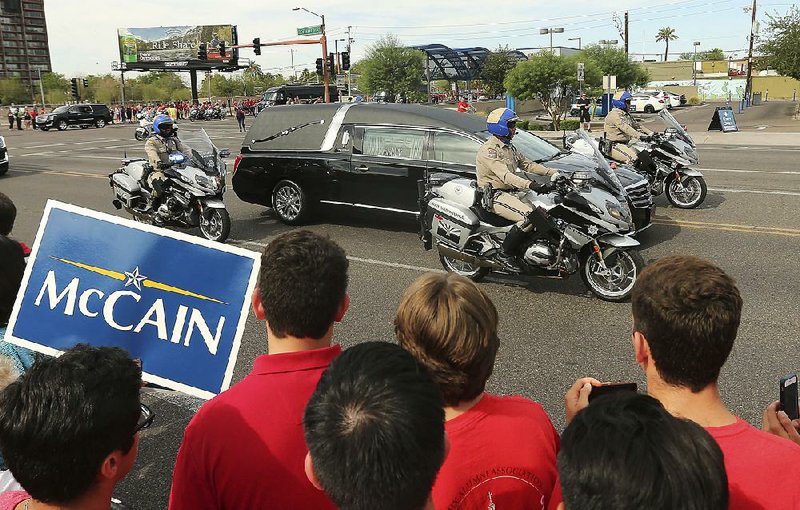WASHINGTON -- Not long after U.S. Sen. John McCain learned last summer that he had terminal brain cancer, he began convening meetings every Friday in his Capitol Hill office with a group of trusted aides. The subject was his funeral.
He obsessed over the music, selecting the Irish ballad "Danny Boy" and several patriotic hymns. He choreographed the movement of his coffin from Arizona, his home state, to Washington. And in April, when he knew the end was coming, he began reaching out to Republicans, Democrats and even a Russian dissident with requests that they deliver eulogies and serve as pallbearers.
By the time he died Saturday, McCain had carefully stage-managed a four-day celebration of his life -- but what was also an unmistakable rebuke to President Donald Trump and his agenda. For years, Trump had criticized the senator from Arizona. In death, McCain found a way to have the last word, even quietly making it clear through friends that Trump was not welcome at the services.
"I think it's fair to say that they have a very different view of this country and what this country means, here and abroad," said Mark Salter, the senator's longtime friend and co-author who sat with McCain -- often with a lump in his throat -- during the many discussions about McCain's looming death. "His overall message was: 'It doesn't have to be this s***ty.'"
The series of events honoring McCain is the kind of grandiose spectacle that is normally reserved for someone who became president, not someone who twice failed to do so. Friends said McCain was surprised by the level of interest in his death even as he planned it.
When advisers suggested that he should lie in state at the Arizona Capitol, McCain said he believed the Legislature would never approve such a rare honor for him, recalled Rick Davis, who had been at McCain's side for decades and served as his 2008 campaign chairman.
"Every inch of the way, he underestimated what he thought this would be about," Davis said.
The memorial events this week began in Arizona on Wednesday, when McCain's body was taken to the Capitol, and continued Thursday at a service at North Phoenix Baptist Church. The procession then shifted to the nation's capital, where McCain's coffin will arrive at an air base outside Washington.
By the weekend, when virtually all of official Washington -- Democrats and Republicans alike -- will gather at the National Cathedral for a nationally televised farewell, Trump is expected to have retreated to Camp David.
McCain's closest friends insisted this week that the senator did not harbor a personal grudge toward the president, even at the end. They described him as mostly interested in promoting the cause of bipartisanship and compromise that, as a "maverick" lawmaker, he had carefully fashioned into one of the most durable political brands of the past half-century.
In the spring, McCain began the uncomfortable task of asking people to speak for him after he died. In April, he approached former Presidents Barack Obama and George W. Bush, a bipartisan request to the men who defeated him in his quests for the White House.
But prominent politicians will not be the only participants. Pallbearers will be friends McCain made over the years, including actor Warren Beatty and Frederick Smith, the founder of FedEx. Larry Fitzgerald, the wide receiver who played for McCain's beloved Arizona Cardinals, was asked to speak at Thursday's memorial service in Phoenix.
Former Vice President Joe Biden was among people summoned to Sedona, Ariz., when McCain began forming his funeral plans with a newfound urgency.
They spoke for hours before McCain asked Biden to deliver a eulogy at his funeral in Arizona. Biden immediately accepted, said someone close to the vice president, and he will also serve as a pallbearer Saturday in Washington.
James Mattis, Trump's secretary of defense, said he had been asked long ago to be a pallbearer at the final event, a private service that will be held Sunday at the U.S. Naval Academy in Annapolis, where McCain is to be buried.
McCain's career in politics was built around his reputation for bluntness. During the 2000 and 2008 presidential campaigns, he spent hours talking with reporters -- on the record -- sitting on couches in the back of a bus that he strategically named the "Straight Talk Express."
In death, some of his messages were equally direct. On Monday, Davis read McCain's final, pull-no-punches remarks to reporters. It escaped no one that McCain was talking about the current president.
"We weaken our greatness when we confuse our patriotism with tribal rivalries that have sown resentment and hatred and violence in all the corners of the globe," McCain wrote. "We weaken it when we hide behind walls, rather than tear them down, when we doubt the power of our ideals, rather than trust them to be the great force for change they have always been."
A Section on 08/31/2018

